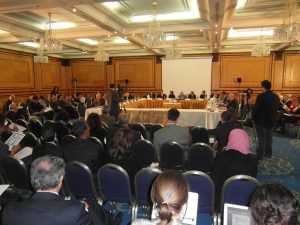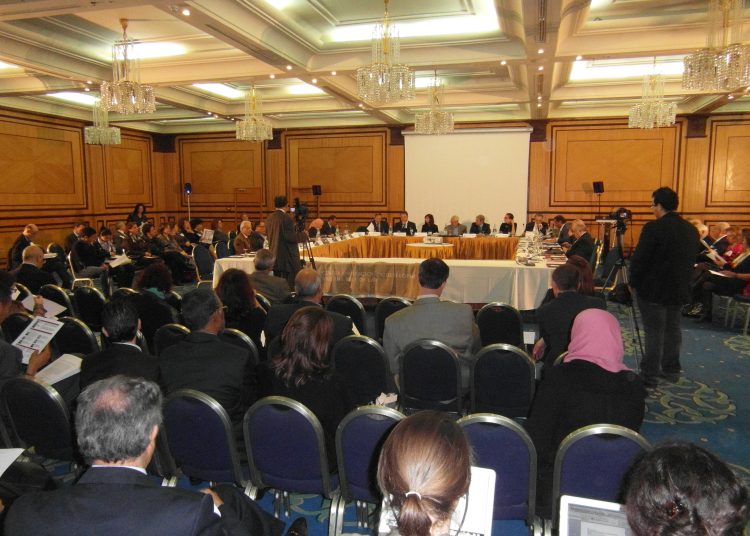By Sami Zaptia.

Tripoli, 31 March 2013:
The Programme on Arab Reform and Democracy’s 4th Annual Conference was held in Tunis 28-29 March under . . .[restrict]the title ‘Building Bridges: Towards Viable Democracies in Tunisia, Egypt and Libya’.
The programme is part of the Centre on Democracy, Development and the Rule of Law (CDDRL) at Stanford University, USA and was held in collaboration with (CEMAT) Centre for Maghrebi Studies, Tunis and University of Tunis, El Manar.
The conference included presentations by participants from all three Arab Spring nations and included Rashid Ghannoushi, Islamic scholar and president of the Tunisian Islamist Ennahda party and Beji Essebssi, president of Nida Tunis the secular political coalition who served as interim prime minister in 2011.
The conference was an opportunity for participants from the three Arab Spring states to compare notes, analyses and experiences over the last two years. As a participant presenting a paper on the Libyan economy, I was taken aback by the similarities that the three revolutions were sharing.
Delay by the legislature in drafting the constitution, the legislature going beyond its constitutionally designated role and schedule, the constitutional drafting committee being elected or chosen, and being dominated by a certain group, the role of Islam and Sharia, ineffective and partisan government, the authorities not doing enough to solve everyday issues and the economy, minority issues, the role of NGOs, intimidation by militias, self-appointed guardians of the revolution were themes present in all states.
There was also deep and wide discussion in all three countries of concepts of legitimacy, citizenship, representativeness, inclusiveness, equality, pluralism, tolerance, debate, process, and consensus – varying degrees.
Rashid Ghannoushi, talking about citizenship, plurality and viable democracies in Arab Spring nations referred to the concept of citizenship within Islam and early Islamic society in the Medina.
He regarded that as the first example or model of a constitution of a pluralistic society. The Medina had different religions and tribes living within it – yet they were able to achieve citizenship of the new Islamic city without any suppression. He feels that this model has been neglected, yet it offers progressive Islamic democracies an important precedent. Ghannoushi felt that Tunisia has a draft constitution which is pluralistic.
The Arab Spring Revolutions were a popular initiative, despite many attempting to discredit it by portraying it as Western design.
Regarding Islam, democracy and modernity, Ghannoushi felt that there can be democracy and modernity – with Islamic values. It is not Islam that is wrong,but our interpretation of Islam. The dream of the inclusion modernity within Islam is attainable, he felt. Islam is not a barrier to modernity, he retorted, and accussed the enemies of Islam of wanting to portray the idea that there can be no modernity or progress within Islam.
Ghannoushi admitted that there are barriers and challenges to be faced along the way. He felt that the success of Tunisia would have ramifications on the region and on the challenge of and to Islam. It would also have ramifications on the consensus between Islam and modernity and secularism.
Regarding the need for consensus during the transitional period, Ghannoushi revealed that his party chose to form a consensus government even though they could have achieved a government with a technical majority. He said that his party chose the strategy of consensus which would be needed for drafting a constitution.
On the vexing issue of the role of Sharia law in the constitution, Ghannoushi said that part of his party’s strategy was to avoid the divisions that this issue might cause between Islamists and secularists. He claimed his party wanted to avoid the insistence of the role of Sharia law in the constitution, which he thought some other movements wanted. He referred to Tunisia’s 1959 constitution as a possible way out of the impasse, which simply referred to Tunisia as a ‘Muslim’ state.
Regarding the term Sharia, Ghannoushi asked how could such a term be included in the constitution if there was no clarity about its meaning? We are for excluding it and any other term whose meaning was not clear he insisted. For some the term Sharia indicates danger, for others it indicates order, for others it is a normal and natural term. Everyone interprets it differently he explained.
He admitted that there was still debate over which kind of political system Tunisia was to adopt – parliamentary or presidential. He said that most of the world has opted for parliamentary, but he thought Arabs had a legacy of presidential rule and rule by princes and one person rule that defaulted into dictatorship. He therefore said his party favoured parliamentary rule.
He complained about the politicization of social, union movement and economic demands that are beyond the nation’s capacity to deliver.
Ghannoushi defended against accusations that his government was either turning a blind eye or colluding with those who use armed force to impose their will. He admitted that governments are generally weak unable to impose themselves during transition periods. He also reaffirmed that the government wanted to be a state of the rule of law.
There was fear that an Islamist government will force a certain type of society on Tunisians, Ghannoushi added, but that if you walked down the streets and beaches you could see people living different types of lives. He noted how the mosques and bars still co-existed. The reality he said was that Tunisians still lived as they wished and it was not part of his policy to change that. We want democracy he added and that liberty and freedom is at the heart of Islam.
Regarding self-appointed organisations declaring themselves the guardians of the revolution, Ghannoushi felt that there were many groups in Tunisia playing that role and he had no objection so long as they were unarmed.
Beji Essebssi, for his part, felt that the Tunisian government was elected for a specific purpose – to draft the constitution and not to act as a full legislative body. It had already let a year pass and is changing the original deadline not having set up the electoral commission and the electoral law was not prepared.
He said that Tunisia did not want to replace the old president with a new president. Congress is supposed to continue the process of democracy and not turn into a legislative body. It was supposed to practice consensus politics and not technical majority and seel consensual legitimacy and not electoral legitimacy.
Essebssi felt that Tunisia is an Islamic country and not an Islamist state and that the Islamic debate had delayed the drafting of the constitution. He maintained that Tunisia was always a moderate state and that now finally it has been agreed to keep the article of the constitution that simply said Tunisia was a Muslim country. He felt the status of women was still a contentious issue.
Regarding the role that Tunisia played in helping in the Libyan revolution, Essebssi felt that that was a duty that needed no thanks. We were returning what Libyans did for Tunisians when they had to escape to Libya during its dark years, he explained.
Samir Morcos, a Coptic Egyptian and former assistant to the Egyptian president noted that there were currently three different sorts of legitimacies at play in Egypt: that of the street, of parliament and by the use of force. With regards to minority rights, he was surprised why Egypt was revisiting issued he thought it had resolved decades if not centuries ago. Egypt had a rich body of heritage, culture, academia and legacy, yet it was approaching issues as if for the first time. The period of transition should be about consensus and not technical majorities, he felt. [/restrict]







